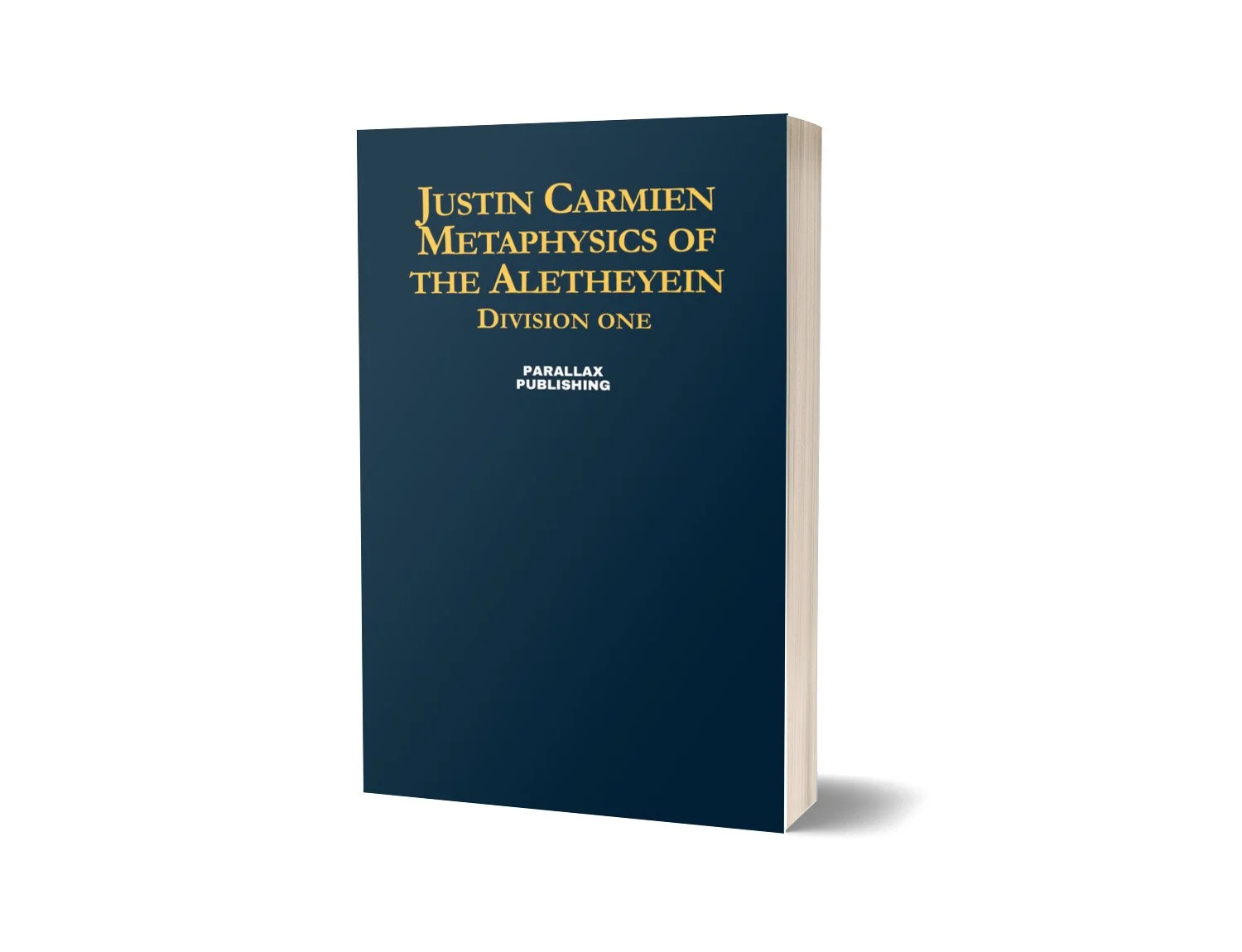Justin Carmien: Metaphysics of the Aletheyein, Division One
Philosophy
ISBN 979-13-990253-3-0
280Pages, 13 x 20 cm, Paperback. €19,90
Release date August 15th, 2025
You want to buy the whole edition of Parallax books with a 25% discount? Order at redaktion@parallax-magazin.de
Foundation of the Metamodern Paradigm
The subject matter of modern philosophy has gone by various names: the cogito sum, transcendental subject, Dasein, or the dividual. However, these descriptions do not merely refer to subject matter for philosophers, but are a description of a “subiectum” which is prior to the world and which accounts for its being. Throughout modern philosophical inquiry, these subiectum have been expressed by “I” or, in the case of Dasein, “mine”. As such, these metaphysics can collectively be called subjectivist. The reason for this is that, in each case, the subject matter is human being—whether that being is described in terms of mental faculties or whether it can be exemplified through the social commerce of the human animal. In subjectivist metaphysics, reality is conditioned in objectivity and, in turn, objectivity in human subjectivity. However, this form of description no longer speaks towards our phenomenal experience. It only seems to obstruct solutions to our personal, social, and political concerns.
Today, what distinguishes us from our modern predecessors is not the peculiarity of the “I” or the “mine”, but rather the “we”. The nation-form which Aristotle, G.W.F. Hegel, and Martin Heidegger lived, for example, can no longer be identified. The phrase, “We, the People...” has lost its meaning. Not only does the “we” no longer refer to those human animals who are physically present with us, and represent “our people”, but the “we” is not exhausted by the phenomenon of human morphology. This follows the various advancements in machine learning, suggesting that the “we” should include even non-human animals, as well. Insofar as the “we” is constituted by whatever is shared in an economy of mutual thriving and flourishing, a problem must be made of this pronoun.
This study takes for granted that a sense of the common, shared, and objective can only possible when individuals feel secure enough to disclose the truth. It is only through their disclosure that we can engage in an interpersonal commerce characterized by a sense of thriving and flourishing together. Only then can we confront the actual and authentic “we”. However, if we are to recognize anything resembling an actual and authentic “we”, when and where it manifests, and speak intelligently about “our economy”, then possession of an idea of the “we” is necessary. Therefore, while this study takes as its goal the identification of an idea of the “we”, it does so merely as a catalyst. The realist metaphysics which describes the “we” not only satisfies our want for description but also serves as a guide for prescription as well.
Metaphysics of the Aletheyein, Division One: Foundation of the Metamodern Paradigm follows the metaphysical tradition which began with Immanuel Kant. It traces the history of metaphysics up to the present moment, where it remains stagnant. During the period of postmodern thought, metaphysics was largely abandoned. Today, we seek a richer description of subjectivity. In this moment of history, a novel subiectum announces itself—the αληθευειν.
Justin Carmien grew up in Northern Indiana, where his family has local roots. His great-grandfather, John Raber, ran for Congress in Indiana’s Second District in 1964, losing to then-House Minority Leader Charles Halleck. Following the campaign, Raber established Raber Golf, an 18-hole course located just outside Bristol, Indiana, which continues to be family-operated to this day.
As an adult, Justin began his career as an entrepreneur by founding a publishing company in the United States. He later relocated to Denmark to pursue opportunities in product design and marketing. While in Denmark, he partnered with Spinderihallerne—a municipal cultural and innovation hub located in the town of Vejle—where he hosted salons on philosophy in collaboration with international community developers.
In 2017, Justin launched a YouTube channel dedicated to exploring Scandinavian political philosophy, with a particular emphasis on the emerging metamodern movement. His videos garnered recognition for their thought-provoking insights and original reflections on contemporary thinkers, including the Russian political strategist Aleksandr Dugin.
Justin’s current studies further develop ideas from within the metamodern paradigm through what he refers to as "first economics philosophy.” Drawing on Martin Heidegger’s interpretations of Ancient Greek philosophy, this approach explores metaphysics as a foundation for value creation—one which encompasses both the phenomenon of the artist as well as the politician. He positions this philosophy as a “thinking space”, offering metaphysics as a response to the challenges of public life, particularly in the pursuit of truth and authenticity through policy and governance.
Justin currently serves as the president of his neighborhood association in Edgewater, Chicago, and works as a designer for the Government Finance Officers Association, a local government think tank based in Chicago.

